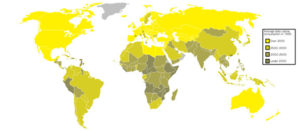 The number of calories you need to eat each day depends on several factors, including your age, size, height, sex, lifestyle, and overall general health.
The number of calories you need to eat each day depends on several factors, including your age, size, height, sex, lifestyle, and overall general health.
As an example, a physically active 6ft 2in male, aged 22 years, requires considerably more calories than a 5ft 2ins sedentary woman in her 70s.
It has been discovered that factors such as how you eat your food can influence how many calories get into your system. The longer you chew your food, the more calories the body retains, a team from Purdue University found.
If you would like to learn more about calories – what they are and what they are important for – you might want to take a look at our Knowledge Center article all about calories. The rest of this article will discuss how your body uses calories and how many your body might need to achieve optimum energy levels.
Contents of this article:
Recommended daily calorie intakes
Calorie intake calculator
How much should you weigh?
Fast facts on daily calorie intake
Here are some key points about daily calorie intake. More detail and supporting information is in the main article.
Recommended calorie intake depends on factors such as age, size, height, sex, lifestyle and overall general health.
The longer you chew your food, the more calories your body retains.
Recommended daily calorie intakes in the US are 2,700 for men and 2,200 for women.
Eating a big breakfast could help with weight reduction and maintenance.
When food is eaten may matter as much as what and how many calories are eaten.
Average calorie consumption in industrialized nations and a growing number of emerging economies is higher than it used to be.
Approximately 20% of the energy used in the human body is for brain metabolism.
Ideal body weight depends on several factors including age, bone density and muscle-fat ratio.
The types of food that calories are acquired from are highly important in terms of nutrition.
A 500-calorie meal consisting of fruits and vegetables is much better for your health and will keep you from being hungry for longer than a 500-calorie snack of popcorn.
Recommended daily calorie intakes
Recommended daily calorie intakes vary across the world. According to the National Health Service (NHS), UK, the average male adult needs approximately 2,500 calories per day to keep his weight constant, while the average adult female needs 2,000. US authorities recommend 2,700 calories per day for men and 2,200 for women.
The NHS stresses that rather than precisely counting numbers (calories), people should focus more on eating a healthy and well balanced diet, being physically active, and roughly balancing how many calories are consumed with the numbers burnt off each day. If you eat your five portions of fruit and vegetable per day, you will probably live longer, Swedish researchers reported in the American Journal of Clinical Nutrition (July 2013 issue).
According to the United Nations’ Food and Agriculture Organization (FAO), the average person’s minimum calorie requirement per day globally is approximately 1,800 kilocalories (7,500 kJ).
Worldwide food consumption
Daily calorie consumption varies considerably around the world
(countries in gray indicates “no data available”)
. Image by Interchange88
Over the last twenty years, sugar has been added to a growing number of foods we consume. Unfortunately, food labels in the USA and Europe do not include details on how much added sugar there is . Dr Aseem Malhotra, a cardiologist, wrote in BMJ in June 2013 that “(it has become) almost impossible for consumers to determine the amount of added sugars in foods and beverages.”
Timing could be as important as how many calories you eat
A big breakfast helps bring your weight down or keep it down – researchers from Tel Aviv University explained in the medical journal Obesity that a large breakfast – one containing approximately 700 calories – is ideal for losing weight and reducing your risk of diabetes, heart disease, and high cholesterol.
When we eat our food probably matters as much as what and how many calories we eat, team leader Prof. Daniela Jakubowicz added.
Portion sizes
In industrialized nations and a growing number of emerging economies, people are consuming many more calories than they used to. Portion sizes in restaurants, both fast food ones as well as elegant places, are far greater today.
Comparing cheeseburger sizes over the last 20 years
The average cheeseburger in the USA 20 years ago had 333 calories, compared to the ones today with over 600 calories
What is the difference between calories and kilocalories?
Scientifically speaking, one kilocalorie is 1,000 calories. However, the term calorie in lay English has become so loosely used with the same meaning as kilocalorie, that the two terms have virtually merged. In other words, in most cases, a calorie and kilocalorie have the same meaning.
A kilocalorie is the amount of energy required to raise the temperature of 1 kilogram of water from 15° to 16° Celsius (centigrade) at one atmosphere.
A “small calorie” refers to the traditional scientific term of calorie, meaning one-thousandth of a kilocalorie.
Internationally, most nations talk about food energy in kJ (kilojoules). 1 kcal (kilocalorie) = 4.184 kJ.
In this article, the term “calorie” means the same as “kilocalorie” or “kcal”.
MNT DT






